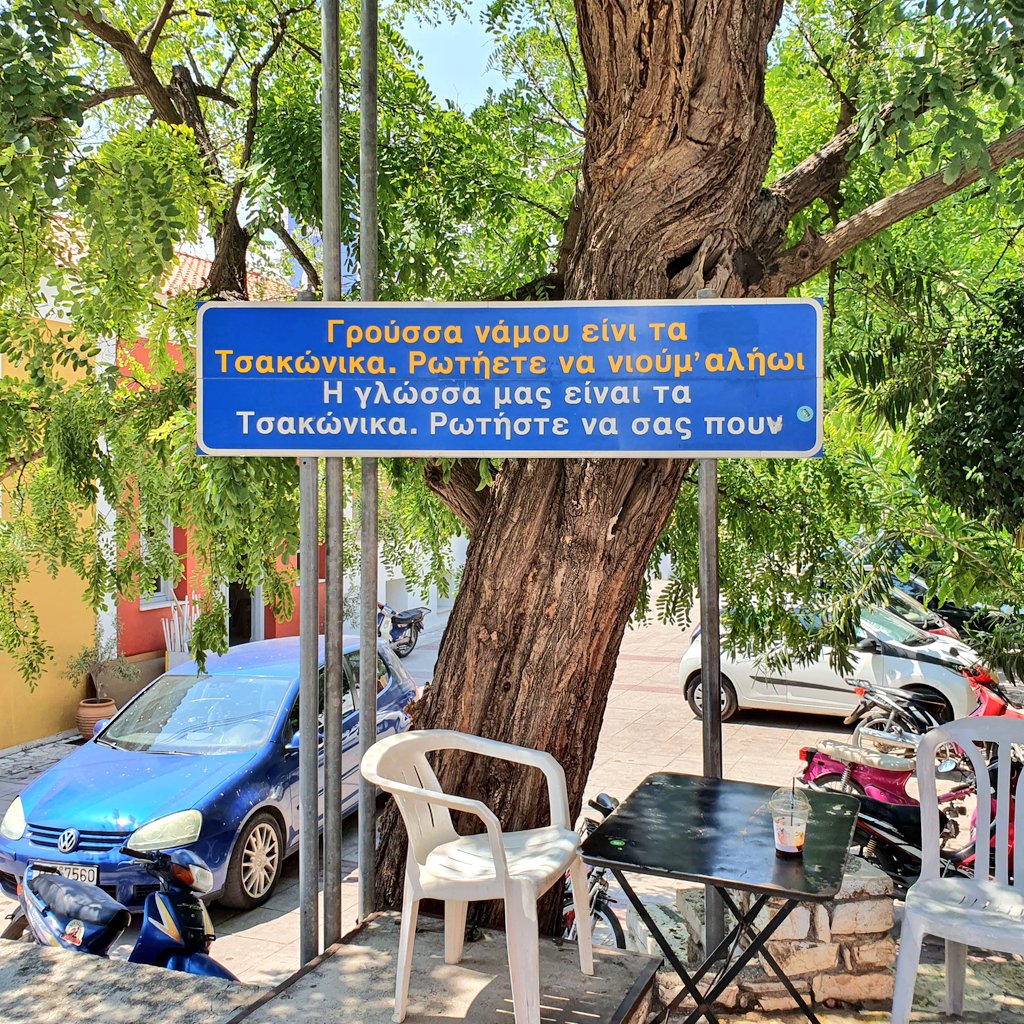I& #39;m in Greece at the moment working on a short documentary about the Tsakonikan language revival movement. Here& #39;s a brief thread to explain what it& #39;s all about and some things the world can learn from the struggles being faced here in rescuing Tsakonika from extinction  https://abs.twimg.com/emoji/v2/... draggable="false" alt="🇬🇷" title="Flagge von Griechenland" aria-label="Emoji: Flagge von Griechenland">
https://abs.twimg.com/emoji/v2/... draggable="false" alt="🇬🇷" title="Flagge von Griechenland" aria-label="Emoji: Flagge von Griechenland">
1/ Tsakonika is an ancient language spoken in remote and isolated rural communities on the eastern coast of Arcadia, southern Greece. Tsakonika is the only surviving descendent of the Lakonian dialect, spoken by the ancient Spartans. Today, its survival is not guaranteed.
2/ Nowadays the language is spoken by a few hundred people, almost all of whom are over the age of 65. The language has been viewed at best with indifference by new generations, at worst seen as inferior due to stories about the Tsakonian people converting to Christianity late.
3/ Tsakonika was essentially wiped out after the road to Athens was completed in 1957, at which point approximately half of the population emigrated to other parts of Greece, the US, Australia and everywhere with jobs. Those that remained did not see the language as a priority.
4/ The arrival of mass media and TV in modern Greek meant that new generations of Tsakonika speakers had less exposure to their ancestral language and were more proficient in Greek. Military dictatorship and fascist language policies contributed to all Greek dialects& #39; decline.
5/ Another challenge is that in Greece, all languages that are not modern Greek are called "dialects", even if they are not mutually intelligible with Greek. This unavoidably downgrades their status in the view of most speakers and implies that they are inferior or old fashioned.
6/ In 2017, Panagiotis Marneris returned to his home village after decades of living to the US and found to his horror that nobody could speak his first language any more. With help from others, he founded the first organisation promoting the language& #39;s revival: the Tsakonoparea.
7/ The Tsakonoparea runs events to promote Tsakonika and raise its status. It also offers lessons in schools, although the Greek state education system does not have any room for the teaching of historical or regional languages, except for Ancient Greek and foreign languages.
8/ However, a HUGE problem for Tsakonika is that it now needs to adapt to the digital age, and become a language that people send WhatsApps in etc. Yet Tsakonika was never a written language, only passed down orally from generation to generation. How do you write it down?
9/ Modern Greek linguists noticed Tsakonika had many consonants and vowels that have survived from ancient Greek but are extinct in the modern language. They therefore created extra letters to express them, such as a λ with a dot under it for & #39;ly& #39; and the same with ν for & #39;ny& #39;.
10/ This is a nail in the coffin for Tsakonika EVER becoming a digital language, as no Greek keyboard in the world has these letters. This orthography is highly controversial amongst remaining native speakers, as it is strangling it. It means people will always write in Greek.
11/ In the era of corona virus, with so many of the few remaining speakers being old and vulnerable, there has never been a more critical time to make this film and tell this story. It& #39;s also never been more challenging. But I am here to do precisely that. I will keep updating!

 Read on Twitter
Read on Twitter " title="I& #39;m in Greece at the moment working on a short documentary about the Tsakonikan language revival movement. Here& #39;s a brief thread to explain what it& #39;s all about and some things the world can learn from the struggles being faced here in rescuing Tsakonika from extinction https://abs.twimg.com/emoji/v2/... draggable="false" alt="🇬🇷" title="Flagge von Griechenland" aria-label="Emoji: Flagge von Griechenland">" class="img-responsive" style="max-width:100%;"/>
" title="I& #39;m in Greece at the moment working on a short documentary about the Tsakonikan language revival movement. Here& #39;s a brief thread to explain what it& #39;s all about and some things the world can learn from the struggles being faced here in rescuing Tsakonika from extinction https://abs.twimg.com/emoji/v2/... draggable="false" alt="🇬🇷" title="Flagge von Griechenland" aria-label="Emoji: Flagge von Griechenland">" class="img-responsive" style="max-width:100%;"/>


